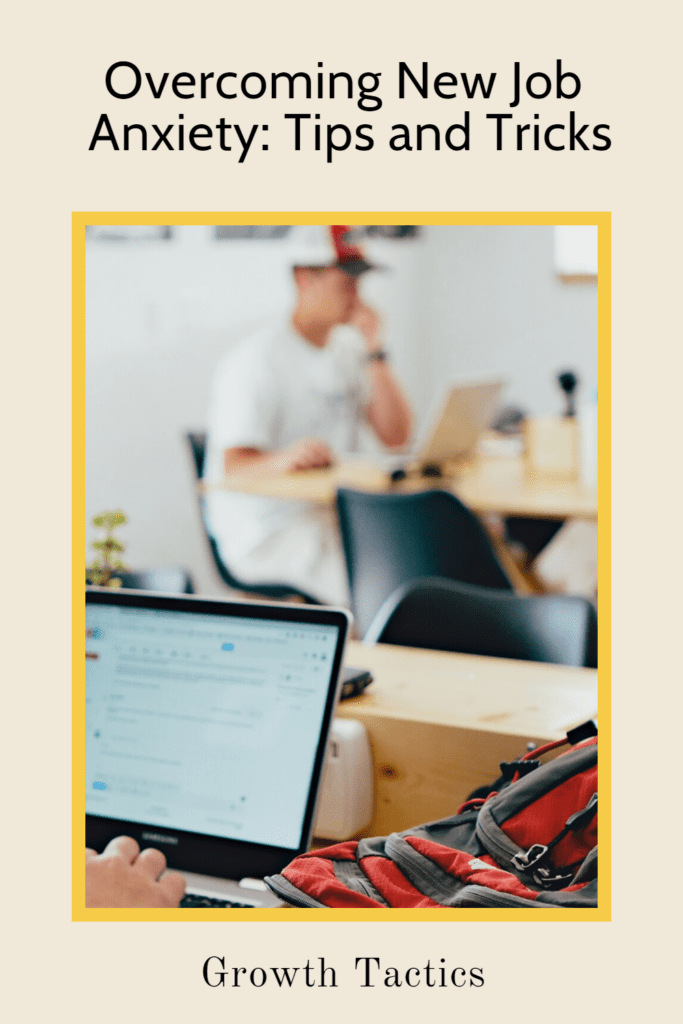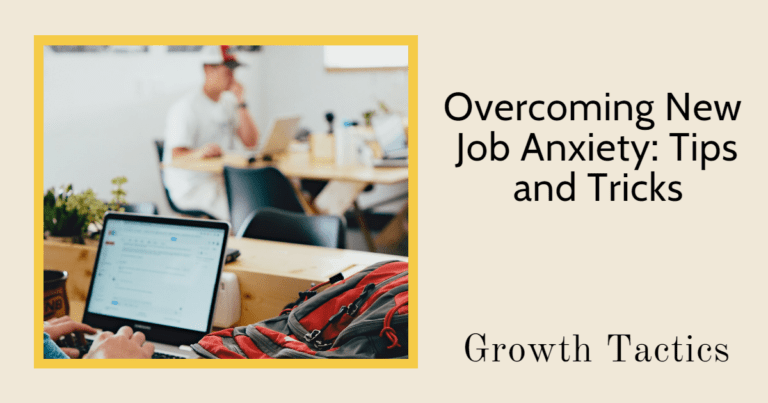Starting a new job often comes with a mix of excitement and anxiety. While it’s natural to feel a little stressed when embarking on a new career journey, it’s crucial to address and manage this anxiety so you can perform at your best.
In this article, we’ll explore practical tips and tricks to help you overcome new job anxiety, enhance your job performance, and create a positive work environment. With these strategies in hand, you’ll be equipped to navigate the challenges of your new job with confidence and poise.
Jump To Section
Understanding New Job Anxiety

Common triggers of new job anxiety
New job anxiety can be triggered by several factors, such as:
Fear of the unknown: Uncertainty about job responsibilities, workplace culture, and colleagues can make adjusting to a new role challenging.
Performance expectations: The pressure to prove oneself and perform well in a new position can be a significant source of stress.
Imposter syndrome: Doubting one’s abilities and fearing being exposed as a “fraud” can lead to heightened anxiety in a new job.
Social anxiety: Establishing new relationships with coworkers and fitting into the company culture can be daunting for some individuals.
Change in routine: Adapting to new schedules, workloads, and commute times can disrupt one’s sense of stability and contribute to anxiety.
The psychological aspect of job-related stress
The psychological aspect of job-related stress cannot be ignored. It can manifest itself in various forms, such as:
Constant worry and overthinking: Individuals may find themselves preoccupied with thoughts about their job performance, relationships, and fitting in.
Negative self-talk: Internal criticism and self-doubt can exacerbate anxiety, making it difficult to stay focused and confident.
Physical symptoms: Stress and anxiety can manifest as physical symptoms, such as headaches, muscle tension, or gastrointestinal issues.
Emotional exhaustion: Prolonged anxiety can lead to burnout and a decreased ability to cope with everyday challenges.
How new job anxiety affects various aspects of life
New job anxiety can have a ripple effect on different aspects of one’s life, including:
Personal relationships: Anxiety can strain personal relationships, as individuals may become more irritable or withdrawn.
Physical health: Chronic stress and anxiety can weaken the immune system, making individuals more susceptible to illness and fatigue.
Mental health: Persistent anxiety can lead to symptoms of depression, as well as exacerbate existing mental health conditions.
Work-life balance: When anxiety is not managed effectively, individuals may find it challenging to maintain a healthy work-life balance. This leads to further stress and dissatisfaction.
Understanding the triggers, psychological aspects, and effects of new job anxiety is the first step toward addressing and managing it. Next, we’ll discuss how to overcome the anxiety caused by a new job.
Coping Strategies for New Job Anxiety

Embrace a growth mindset
Adopting a growth mindset is a powerful approach to managing new job anxiety. This mindset, rooted in the belief that learning and growth are ongoing processes, allows you to embrace the challenges that come with a new position as an integral part of your professional journey.
By adopting a growth mindset, you can transform your perspective on failure. Viewing setbacks not as insurmountable obstacles, but as valuable opportunities for development and personal growth.
A growth mindset can help you build resilience and foster a more positive outlook in the face of new job anxiety. Instead of being paralyzed by the fear of failure, you become more open to experimenting, taking risks, and learning from your experiences. This approach encourages adaptability, curiosity, and perseverance. These are essential qualities for thriving in a new role and achieving long-term career success.
To cultivate a growth mindset, consider incorporating the following strategies:
- Embrace challenges: View challenges as opportunities for growth rather than threats to your success. Approach new tasks, projects, and roles with curiosity and a willingness to learn.
- Practice persistence: Understand that growth takes time and effort. Stay committed to your goals, even when faced with setbacks or obstacles. Maintain a positive attitude and focus on the progress you’re making.
- Seek feedback: Actively seek constructive feedback from supervisors, colleagues, and mentors. Use this feedback to identify areas for improvement and refine your strategies for success.
- Learn from mistakes: Instead of ruminating on setbacks or failures, view them as learning experiences. Reflect on what went wrong, identify lessons learned, and apply this knowledge to future endeavors.
- Surround yourself with positive influences: Build a support network of individuals who share a growth mindset and encourage your personal and professional development. Engage with mentors, colleagues, and friends who inspire you to learn, grow, and overcome challenges.
- Reframe negative thoughts: When faced with negative thoughts or self-doubt, reframe them in a more positive, growth-oriented context. For example, instead of thinking, “I’m not good at this.” consider, “I’m not good at this yet, but I can improve with practice and effort.”
By embracing a growth mindset, you can more effectively navigate the challenges and anxiety often accompanying a new job. This approach empowers you to view setbacks as opportunities for development. Therefore, fostering a more positive, resilient, and adaptable attitude that sets the foundation for long-term success in your career.
Set realistic expectations
Setting realistic expectations is a crucial factor in managing new job anxiety. As you embark on a new position, it’s important to understand that making mistakes and adapting to new situations are natural components of the learning process.
By avoiding the expectation of perfection and practicing patience, you can ease the stress associated with starting a new job and create a healthier, more productive work experience.
To set realistic expectations when starting a new position, consider the following strategies:
- Break down goals into manageable steps: Instead of focusing on long-term or overarching objectives, break them down into smaller, achievable milestones. This approach can help you maintain motivation. Giving you a clearer sense of progress as you navigate your new role.
- Reflect on past experiences: Remember that you’ve faced challenges and adapted to new situations before. Use these experiences as a reminder of your ability to learn and grow, and apply the lessons you’ve learned to your new position.
- Seek guidance from others: Reach out to colleagues, supervisors, or mentors for advice and support as you acclimate to your new job. Their insights and experiences can help you establish reasonable expectations and provide valuable guidance in overcoming challenges.
- Give yourself time to adjust: Recognize that it takes time to become proficient in a new role. Be patient with yourself as you learn new processes, develop relationships, and build your skills. Remember that growth and improvement are ongoing processes.
- Focus on progress, not perfection: Instead of striving for perfection, concentrate on making steady progress in your new role. Celebrate your accomplishments and learn from your mistakes, recognizing that both are integral parts of the learning journey.
- Maintain a growth mindset: As mentioned earlier, cultivating a growth mindset can help you view setbacks as opportunities for development rather than failures. Embrace the learning process and stay open to new experiences and challenges.
By setting realistic expectations and practicing patience, you can alleviate much of the anxiety associated with starting a new job. This approach allows you to navigate the learning process more effectively, fostering a healthier and more positive work environment. Ultimately, embracing the journey of growth and adaptation can lead to greater job satisfaction and long-term career success.
Build a support network

Building a support network is a vital component in handling new job anxiety. Establishing connections with colleagues, friends, and mentors provides you with valuable guidance and encouragement as you face the challenges that come with a new role.
Sharing your experiences, discussing difficulties, and seeking advice not only facilitates your learning but also helps alleviate anxiety by fostering a sense of camaraderie and understanding.
To effectively build a support network, consider implementing the following strategies:
- Be proactive in forming connections: Take the initiative to introduce yourself and engage in conversation with your new colleagues. Attend team-building events, meetings, or social functions to develop relationships and establish rapport with your coworkers.
- Identify potential mentors: Seek out individuals within your organization who have experience and expertise in your field or role. Establish a mentor-mentee relationship to gain valuable insights, guidance, and support in your new role.
- Maintain existing relationships: Stay connected with friends, family, and former colleagues who can offer emotional support, encouragement, and a fresh perspective as you navigate the challenges of your new job.
- Join professional networks or associations: Participate in industry-specific groups or associations, such as LinkedIn Groups. This allows you to expand your network and connect with professionals who share your interests and career goals. This can provide additional opportunities for learning, growth, and collaboration.
- Be willing to share your experiences: Openly discuss your challenges, successes, and lessons learned with your support network. Honest communication can help build trust and foster deeper connections, as well as provide opportunities for valuable feedback and advice.
- Offer support to others: Be a resource for your colleagues, friends, and mentees by offering guidance, encouragement, and assistance when needed. Building a support network is a reciprocal process, and your willingness to help others can strengthen your relationships and enhance your own learning experience.
By creating a strong support network, you can effectively manage new job anxiety and foster a sense of camaraderie. These connections not only provide guidance and encouragement but also create a nurturing environment that promotes learning and personal growth. Ultimately, a robust support network can be instrumental in achieving long-term success in your new role and career.
Practice self-compassion
Practicing self-compassion is essential in managing new job anxiety and fostering personal and professional growth. By treating yourself with kindness and understanding, you acknowledge that anxiety is a normal part of the human experience. Recognizing and celebrating your accomplishments and progress can help build self-confidence and resilience.
Here are some ways to practice self-compassion in your new job:
- Acknowledge your feelings: Allow yourself to experience and accept your emotions, including anxiety, without judgment. Recognize that these feelings are a natural part of adapting to a new environment and role.
- Be kind to yourself: Speak to yourself the way you would speak to a friend facing similar challenges. Offer reassurance, encouragement, and understanding instead of harsh criticism or judgment.
- Focus on your strengths: Remind yourself of the skills and qualities that led to your success in the past and your new job opportunity. Emphasize your strengths and use them to navigate challenges in your new role.
- Celebrate your progress: Recognize and appreciate the small victories and improvements you make in your new job. Regularly take time to reflect on your achievements and progress, no matter how minor they may seem.
- Learn from setbacks: Instead of dwelling on mistakes or failures, view them as opportunities for growth and learning. Identify what you can learn from these experiences and apply that knowledge to future challenges.
- Practice self-care: Prioritize your physical, mental, and emotional well-being by engaging in activities that promote relaxation and rejuvenation. This might include exercise, meditation, spending time with loved ones, or pursuing hobbies and interests.
- Set realistic expectations: As mentioned earlier, establish achievable goals and be patient with yourself as you adapt to your new role. Recognize that it takes time to learn and grow, and avoid expecting perfection from yourself.
By practicing self-compassion, you cultivate a more positive and resilient mindset, making it easier to navigate new job anxiety. Treating yourself with kindness and understanding allows you to acknowledge your accomplishments, learn from setbacks, and continue to grow in your new role.
Prioritize self-care
Prioritizing self-care is essential in managing stress and anxiety, particularly when starting a new job. By taking care of your physical and mental well-being, you are better equipped to handle challenges, maintain focus, and perform at your best. Ensuring that you get enough sleep, eat well, and engage in regular exercise can significantly impact your overall health and ability to manage stress effectively.
Here’s some things you can do to prioritize self-care:
- Adequate sleep: Sleep is a fundamental aspect of self-care, as it allows your body and mind to rest, recover, and recharge. Aim for 7-9 hours of sleep per night. Establish a consistent sleep schedule and create a relaxing bedtime routine to enhance the quality of your sleep.
- Balanced nutrition: Eating a well-balanced diet that includes a variety of fruits, vegetables, whole grains, lean proteins, and healthy fats can help provide the energy and nutrients necessary to cope with stress and maintain optimal mental and physical health. Don’t skip meals. Try to avoid excessive consumption of caffeine or sugar, which can lead to energy crashes and increased anxiety.
- Regular exercise: Engaging in regular physical activity has been proven to reduce stress levels, improve mood, and enhance overall well-being. Aim for at least 150 minutes of moderate-intensity aerobic exercise per week. Incorporate activities you enjoy, such as walking, running, swimming, or yoga.
- Mindfulness and relaxation techniques: Incorporate mindfulness practices, such as meditation, deep breathing exercises, or progressive muscle relaxation, into your daily routine. These techniques can help you manage stress, increase self-awareness, and maintain a sense of calm amidst the challenges of your new job.
- Set boundaries: Establish clear boundaries between your work and personal life to prevent burnout and maintain a healthy work-life balance. This may include setting specific work hours, avoiding checking work emails during personal time, and dedicating time to hobbies and social activities.
By prioritizing self-care, you are investing in your well-being. Creating a solid foundation for managing stress and anxiety in your new job. This proactive approach can lead to greater resilience, improved job satisfaction, and long-term career success.
Develop stress-reduction techniques
Developing stress-reduction techniques is crucial in managing anxiety and staying grounded. Especially during times of change and uncertainty, such as starting a new job. By incorporating mindfulness practices, deep breathing exercises, or meditation into your daily routine, you can enhance your ability to cope with stress and maintain a sense of calm and focus.
Here’s some strategies for reducing stress:
- Mindfulness practices: Mindfulness involves paying attention to the present moment non-judgmentally and with curiosity. This practice can help you become more aware of your thoughts, feelings, and bodily sensations, allowing you to identify and manage stress more effectively. You can practice mindfulness through activities such as mindful walking, eating, or even simply observing your breath.
- Deep breathing exercises: Deep, slow, and controlled breathing can help activate your body’s relaxation response, reducing stress and anxiety. One effective technique is the 4-7-8 method. Where you inhale for 4 seconds, hold your breath for 7 seconds, and exhale for 8 seconds. Practicing deep breathing exercises regularly can help you stay grounded and focused during challenging situations.
- Meditation: Meditation is a practice that involves focusing your attention and eliminating the stream of thoughts that may be crowding your mind. Regular meditation has been shown to reduce stress, improve concentration, and increase self-awareness. You can start with just a few minutes of meditation each day and gradually increase the duration as you become more comfortable with the practice. There are various types of meditation, such as guided meditation, body scan, or loving-kindness meditation. You can explore the different types to find the best fit for your needs.
By integrating stress-reduction techniques into your daily routine, you can effectively manage anxiety, enhance your well-being, and stay grounded amidst the challenges of your new job. These practices can also contribute to improved focus and productivity, ultimately leading to greater success and satisfaction in your career.
Seek feedback and ask questions
Seeking feedback and asking questions is an essential aspect of personal and professional growth. Especially when starting a new job or taking on new responsibilities. By embracing curiosity and being open to learning from others, you can build confidence in your abilities, improve your performance, and ensure you’re on the right track.
Here are some tips for getting feedback:
- Cultivate open communication: Foster a culture of open communication with your colleagues and supervisors. Make it clear that you value their input and expertise. This approach can make it easier to seek feedback and ask questions without fear of judgment or criticism.
- Be specific with your questions: When seeking feedback or asking for help, try to be as specific as possible. This not only demonstrates your engagement and understanding of the topic but also makes it easier for others to provide targeted and constructive feedback.
- Reflect on the feedback received: Take the time to reflect on the feedback you receive, considering how you can apply it to improve your performance and grow professionally. This reflection process can help you build confidence in your abilities and ensure you’re on the right track.
- Acknowledge and appreciate the feedback: Express gratitude to those who provide you with feedback and let them know how their input has contributed to your growth. This not only strengthens your professional relationships but also encourages a supportive and collaborative work environment.
By seeking feedback and asking questions, you demonstrate your commitment to growth, enhance your skills and knowledge, and create a strong foundation for success in your new job. This proactive approach can help you build confidence in your abilities and ultimately lead to greater job satisfaction and career advancement.
Focus on your strengths
Focusing on your strengths is a powerful strategy for increasing self-confidence and reducing anxiety in a new role. By identifying your unique skills and strengths, you can better understand how to contribute effectively. Making a positive impact in your workplace.
Here are some tips for focusing on your strengths:
- Self-assessment: Begin by conducting an honest self-assessment of your skills, knowledge, and strengths. Reflect on your past experiences and achievements, considering what has made you successful and what you enjoy doing most. This process can help you recognize your areas of expertise and how they can be applied in your new role.
- Leverage your strengths: Once you have identified your strengths, seek opportunities to incorporate them into your daily tasks and responsibilities. By leveraging your strengths, you can increase your confidence and productivity. Ultimately leading to positive outcomes and recognition from your colleagues and supervisors.
- Develop a personal brand: A strong personal brand can help you stand out and be recognized for your unique skills and strengths. By showcasing your expertise and the value you bring to the organization, you can create a positive reputation that can boost your confidence and career growth.
By focusing on your unique skills and strengths, you can overcome anxiety and build confidence in your new role. This approach not only ensures that you make a positive impact in your workplace but also sets the stage for long-term success and career satisfaction.
When to Seek Professional Help
Identifying the signs of chronic anxiety
Experiencing anxiety is a normal part of life, but when it becomes overwhelming or persistent, it could be an indication of chronic anxiety.
Identifying the signs of chronic anxiety is crucial in determining when to seek professional help. These signs may include:
- Excessive worry: Chronic anxiety can manifest itself as constant and uncontrollable worry, often disproportionate to the situation at hand.
- Physical symptoms: Anxiety can cause physical symptoms such as headaches, muscle tension, digestive issues, or a racing heart.
- Sleep disturbances: Insomnia, difficulty falling asleep, or frequently waking up throughout the night can be associated with chronic anxiety.
- Irritability: Individuals with chronic anxiety may experience increased irritability and a short temper.
- Difficulty concentrating: Anxiety can make it challenging to focus on tasks or maintain attention for extended periods.
The benefits of therapy and counseling
If chronic anxiety is affecting your daily life, seeking professional help through therapy or counseling can be a beneficial step toward managing your symptoms. Some benefits of therapy and counseling include:
- Learning coping strategies: A mental health professional can help teach you effective coping strategies to manage anxiety symptoms, such as relaxation techniques, mindfulness, or cognitive restructuring.
- Identifying triggers: Therapy can help you identify and understand the triggers of your anxiety, enabling you to develop strategies to address them proactively.
- Improving self-awareness: Engaging in therapy can increase your self-awareness and understanding of your thought patterns and emotions, helping you gain control over your anxiety.
- Developing a support system: A mental health professional can provide a safe and supportive environment to discuss your concerns and experiences.
Finding the right mental health professional
Choosing the right mental health professional is essential to ensure the most effective treatment for your anxiety. Here are some tips for finding the right fit:
- Research credentials: Look for professionals with proper credentials and experience in treating anxiety disorders, such as licensed psychologists, clinical social workers, or psychiatrists.
- Seek referrals: Ask for recommendations from friends, family, or your primary care physician. Online resources and directories can also help you find a mental health professional in your area.
- Consider compatibility: It’s important to find a professional with whom you feel comfortable and can establish a trusting relationship. Don’t hesitate to meet with multiple providers to determine the best fit.
- Evaluate the therapeutic approach: Different mental health professionals may utilize various therapeutic approaches, such as cognitive-behavioral therapy (CBT), dialectical behavior therapy (DBT), or psychodynamic therapy. Research these methods and consider which one might be the most suitable for your needs.
By recognizing the signs of chronic anxiety, understanding the benefits of professional help, and knowing how to find the right mental health professional, you can take control of your anxiety and improve your overall well-being.
Conclusion
In conclusion, embarking on a new job presents an incredible opportunity for growth and self-development. It’s natural to experience anxiety but remember that you have the strength and ability to overcome these challenges. By implementing the tips and tricks mentioned above, you can gradually ease your new job anxiety and build a solid foundation for success.
Embrace the learning experiences, and trust in your skills and capabilities. Surround yourself with supportive colleagues, and never hesitate to seek their guidance. As you progress, you’ll find that your confidence will grow, and you’ll be able to tackle any obstacle that comes your way.
Remember, you were hired for a reason, and you have what it takes to excel in your new role. Keep believing in yourself, and your new job will soon become a familiar and rewarding part of your life’s journey.
Did you enjoy this article on overcoming new job anxiety? Please share and subscribe below.


